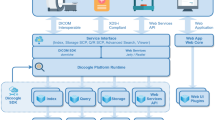Abstract
Teleradiology is the electronic transmission of radiological patient images, such as x-rays, CT, or MR across multiple locations. The goal could be interpretation, consultation, or medical records keeping. Information technology solutions have enabled electronic records and their associated benefits are evident in health care today. However, salient aspects of collaborative interfaces, and computer assisted diagnostic (CAD) tools are yet to be integrated into workflow designs. The Computer Assisted Diagnostics and Interventions (CADI) group at the University at Buffalo has developed an architecture that facilitates web-enabled use of CAD tools, along with the novel concept of synchronized collaboration. The architecture can support multiple teleradiology applications and case studies are presented here.
The architecture is associated with a GUI that enables DICOM viewing and annotation, capabilities that are standard in popular workflow solutions. The architecture integrates computer vision algorithms that normally require large computing power into the workflow process. Unique enhancements have been added to the UI in the form of collaboration tools developed specifically for teleradiology.
This work was supported in part by a grant from NYSTAR.
Access this chapter
Tax calculation will be finalised at checkout
Purchases are for personal use only
Preview
Unable to display preview. Download preview PDF.
Similar content being viewed by others
References
Digisonics, http://www.digison.net
Vital images inc., http://www.vitalimages.com/home.aspx
Alomari, R.S., Kompalli, S., Lau, S.T., Chaudhary, V.: Design of a benchmark dataset, similarity metrics, and tools for liver segmentation. In: Proceedings of the SPIE Medical Imaging Conference (2008)
AMICAS. Amicas corp., http://www.amicas.com/
Florin, C., Paragios, N., Funka-Lea, G., Williams, J.: Liver segmentation using sparse 3D prior models with optimal data support. In: Karssemeijer, N., Lelieveldt, B. (eds.) IPMI 2007. LNCS, vol. 4584, pp. 38–49. Springer, Heidelberg (2007)
GE Corp. Ge advaantage workstation, http://www.gehealthcare.com/usen/aw/index.html
Hinz, M., Pohle, R., Oh Shin, H., Toennies, K.D.: Region-based interactive 3d image analysis of structures in medical data by hybrid rendering, vol. 4681, pp. 388–395. SPIE (2002)
Kaur, G., Tan, J., Alam, M., Chaudhary, V., Chen, D., Dong, M., Eltahawy, H., Fo-touhi, F., Gammage, C., Gong, J., Grosky, W., Guthikonda, M., Hu, J., Jeyaraj, D., Jin, X., King, A., Landman, J., Lee, J., Li, Q.H., Lufei, H., Morse, M., Patel, J., Sethi, I., Shi, W., Yang, K., Zhang, Z.: Casmil: A comprehensive software/toolkit for image-guided neurosurgeries. International Journal of Medical Robotics and Computer Assisted Surgery 2(2), 118–130 (2006)
Whitaker, R., Breen, D., Museth, K., Soni, N.: Segmentation of biological volume datasets using a level set framework. Volume Graphics, 249–263 (2001)
Author information
Authors and Affiliations
Editor information
Editors and Affiliations
Rights and permissions
Copyright information
© 2009 Institute for Computer Sciences, Social Informatics and Telecommunications Engineering
About this paper
Cite this paper
Mehta, N., Kompalli, S., Chaudhary, V. (2009). Web-Based Architecture to Enable Compute-Intensive CAD Tools and Multi-user Synchronization in Teleradiology. In: Weerasinghe, D. (eds) Electronic Healthcare. eHealth 2008. Lecture Notes of the Institute for Computer Sciences, Social Informatics and Telecommunications Engineering, vol 0001. Springer, Berlin, Heidelberg. https://doi.org/10.1007/978-3-642-00413-1_25
Download citation
DOI: https://doi.org/10.1007/978-3-642-00413-1_25
Publisher Name: Springer, Berlin, Heidelberg
Print ISBN: 978-3-642-00412-4
Online ISBN: 978-3-642-00413-1
eBook Packages: Computer ScienceComputer Science (R0)




